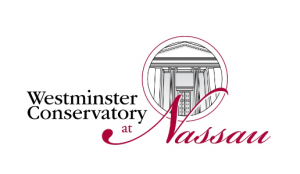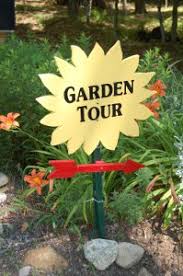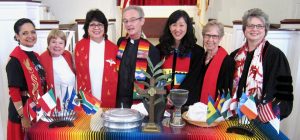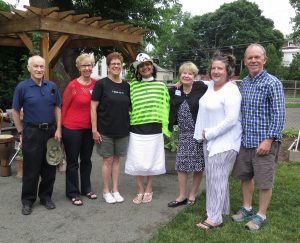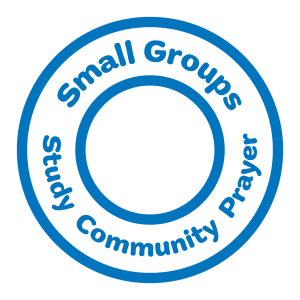 Weary and burdened by a daily dose of news that you only wish you could believe was fake? Tired of living in an age when the Kingdom of Heaven seems like someone’s idea of a cruel joke? Not after signing up for a small group, eight of which return this fall, offering myriad opportunities to strengthen your bonds to the fellowship of love and faith that is Nassau Church.
Weary and burdened by a daily dose of news that you only wish you could believe was fake? Tired of living in an age when the Kingdom of Heaven seems like someone’s idea of a cruel joke? Not after signing up for a small group, eight of which return this fall, offering myriad opportunities to strengthen your bonds to the fellowship of love and faith that is Nassau Church.
Find Your Way Back…
…to the hymns, or contemplate how Christian faith is imagined in dystopian literature. Join a study of the brilliant Frederick Buechner, or attempt to unravel some of the mysteries of John’s gospel. Want a preview of next week’s sermon? We’ve got that! And what better time than now to join others in thinking about the Holy Spirit and the Work of Justice, or a study of Simone Weil’s Gravity & Grace. Finally, Ned Walthall returns with another session on the The Sacred Art of Photography, the medium now central to contemporary art, this time focusing on photography and the parables.
Maybe it’s time to do more than read the paper; maybe it’s time to act. Small Groups at Nassau are in the business of transformation: no one remains unchanged, no one.
Sign Up
Sign up in Fellowship beginning Sunday, September 9, or online after Monday, September 10. Books will be available for purchase in Fellowship on Sunday morning or in the church office during regular business hours.
Groups meet weekly for seven weeks.
Available Small Groups
The small groups with spaces available are listed below.
Complete catalogue: 2018 Fall Small Groups (pdf)
Mondays, Oct. 1 to Nov. 12, 12:00-1:30 p.m.
Faith in the Future: Christianity in Dystopian Literature
Corrie Berg, leader
Berg Home, Princeton
Light lunch (soup & bread) provided
Come read three classics of dystopian literature and learn how Faith is imagined in the future. What role does the church play in these futuristic societies? Are people imprinted with a desire for God even when religion is outlawed? How does our faith influence our view of the individual? We will spend two sessions discussing each book (about 100-150 pages of reading each week). No literature degree required! Come join this casual, welcoming discussion.
Corrie Berg is the Director of Children’s and Family Ministry at Nassau Presbyterian Church. She loves stories (Bible stories, all stories!) and is a life-long reader who believes that great literature helps us understand out own world and ourselves.
Mondays, Oct. 1 to Nov. 12, 7:30-9:00 p.m.
The Road Goes On
Marshall McKnight, leader
Conference Room, Nassau Presbyterian Church
Join us as we learn, share, pray and laugh with theologian, writer, preacher and faithful servant Fredrick Buechner as our guide. Buechner 101: Essays and Sermons by Frederick Buechner will lead us through a time of sharing that will be memorable and powerful. In the book’s forward, Anne Lamott writes of Buechner, “He writes about listening to your own heart, to the rhythms and narrative of your own life.”
Marshall McKnight, a Nassau Church member since 2011, serves as a deacon and is active on the Mass Incarceration Task Force and the Membership Committee. He was a journalist for seven years and for the last fourteen has worked for the State of New Jersey.
Tuesdays, Oct. 2 to Nov. 13, 7:30-9:00 p.m.
The Gospel of John
John Parker, leader
Tazelaar Home, Princeton
John’s Gospel contains some of the most thought provoking and poetic language in the Bible. Using the slim but superb N. T. Wright for Everyone Bible Study Guide, come explore the themes of the Gospel of John and its relevance for our lives today.
John Parker is long time member of Nassau Presbyterian Church. He wears many hats, including Elder, Deacon, Sunday School teacher, Youth leader, and Small Group leader. John appreciates Nassau’s Small Groups very much and still marvels that anyone would ask him to lead one. Somehow, with God’s help we all get by.
Wednesdays, Oct. 3 to Nov. 14, 6:30-7:30 a.m.
Listening Ahead of Time: Preparing for Sunday’s Sermon
Dave Davis, leader
Conference Room, Nassau Presbyterian Church
Bring Your Own Breakfast, coffee & tea provided
Join a Bible study on the sermon text for the coming Sunday, examining and probing and drawing relationships with life and mission as followers of Jesus Christ.
Dave Davis has been pastor and head-of-staff at Nassau since the fall of 2000. His PhD in Homiletics from Princeton Theological Seminary focused on preaching as a corporate act and the active role of the listener in the preaching event. He has published two sermon collections, A Kingdom You Can Taste and Lord and Teach Us to Pray.
Wednesdays, Oct. 3 to Nov. 14, 6:30-7:30 p.m.
The Holy Spirit and the Work of Justice
Len Scales, leader
Conference Room, Nassau Presbyterian Church
Prayerfully consider The Brief Statement of Faith and The Belhar Confession, two confessions of the PC(USA). We will also read The Sarasota Statement, a confessional statement written in 2017, and discuss how we are called to affirm our faith in our own contexts.
Len Scales is Chaplain and Executive Co-Director of Princeton Presbyterians of the Westminster Foundation. In 2017 she helped lead the Young Ministry Leader’s Gathering of the Synod of the Northeast on a similar topic. It was a rich time to remember the power of the Holy Spirit and God’s call on the Church to “do justice, love kindness, and walk humbly.”
Wednesdays, Oct. 3 to Nov. 14, 7:30-9:00 p.m.
Simone Weil’s Gravity & Grace
Mark Edwards & Virginia Kerr, leaders
Edwards Home, Kingston
Simone Weil’s radical thinking swept across numerous fronts in theology, politics, philosophy, and in the daily way she cared for others. She has touched those who have sought both justice in human affairs and light in matters of the spirit. Join us in being challenged to live fully and love gratuitously as we reflect upon her life and work.
Mark Edwards joined Nassau as Director of Youth Ministries in September of 2013. He is a lifelong Presbyterian and holds a PhD (Philosophy and Theology, 2013) from Princeton Theological Seminary. He has been an Assistant of Instruction at Princeton University, and is currently an adjunct professor at The College of New Jersey. Mark is married to Janine and they have two children.
Virginia Kerr is a Princeton attorney who has been active in Nassau’s criminal justice missions for almost two decades, first with ABC Prison Literacy and currently with the Mass Incarceration Task Force. She has been an Assistant Professor of Law at the University of Pennsylvania School of Law where she received her J.D. and more recently has taught courses in history at several New Jersey prisons.
Thursdays, Oct. 4 to Nov. 15, 7:30-9:00 p.m.
Photography and the Parables
Ned Walthall, leader
Conference Room, Nassau Presbyterian Church
plus 2 optional off-site sessions
In the Gospels, Jesus often used parables to teach. When asked by his disciples why he spoke to them in parables, he talks, among other things, about the paradox of seeing and yet not seeing. “That is why I speak to them in parables, because seeing, they do not see.” (Matthew 13: 13). A great photograph is like a parable: it enables us to see what it immediately reminds us we haven’t seen. We will ask ourselves how a photograph can function as a parable, examine some of Jesus’ parables, and create photographs to illustrate them.
No special skill or equipment is required, but you’ll be asked to think about the photographs you take and share them with the group. In addition to Thursday nights, there will be two optional sessions, including a Saturday in New York.
Ned Walthall has been thinking about and taking photographs for years. He is the geeky guy with the long lens at coffee hour. He is currently a candidate for an MFA in Photography at The New Hampshire Institute of Art. His work can be seen at nwalthall.tumblr.com.
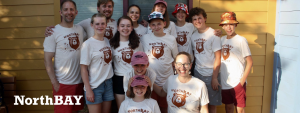 Fourteen NPC’ers returned for the 3rd year to middle school camp at NorthBay on the Chesapeake. The trip included tubing, ropes courses, lots of swimming, a camp speaker, and “Cabin Time” discussions led by NPC leaders.
Fourteen NPC’ers returned for the 3rd year to middle school camp at NorthBay on the Chesapeake. The trip included tubing, ropes courses, lots of swimming, a camp speaker, and “Cabin Time” discussions led by NPC leaders. Forty-five NPC’ers returned for our 5th year in a row (6th total) to work on home repair and community outreach with Appalachia Service Project. We were stationed in Sneedville, TN and six teams were employed at four different work sites. In general the yearly ASP trip continues to add a work-team every year, and this year represented the largest trip to date. ASP continues to be a highlight of yearly NPC youth rhythm. There were no accidents or insurance claims despite hot weather, power tools (no nail-guns), ladders, dogs, and ~1500 miles driven.
Forty-five NPC’ers returned for our 5th year in a row (6th total) to work on home repair and community outreach with Appalachia Service Project. We were stationed in Sneedville, TN and six teams were employed at four different work sites. In general the yearly ASP trip continues to add a work-team every year, and this year represented the largest trip to date. ASP continues to be a highlight of yearly NPC youth rhythm. There were no accidents or insurance claims despite hot weather, power tools (no nail-guns), ladders, dogs, and ~1500 miles driven. Nine NPC’ers & three Beyond Malibu guides hiked the Mt. Zion route in British Columbia’s Jervis Inlet. Participants flew in/out of Vancouver and spent the week in the beautiful, rugged, and remote wilderness of the Coast Mountains. This is the 5th mountain trip NPC has done.
Nine NPC’ers & three Beyond Malibu guides hiked the Mt. Zion route in British Columbia’s Jervis Inlet. Participants flew in/out of Vancouver and spent the week in the beautiful, rugged, and remote wilderness of the Coast Mountains. This is the 5th mountain trip NPC has done.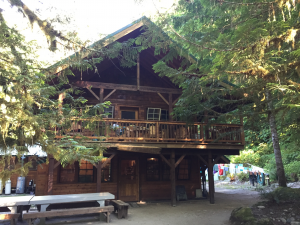 Carl Birge, Allison Harmon, and the Edwards family (Mark, Janine, Adeline, & Elias) spent the interim time between trips in Base Camp. Time was spent reading, cooking, working on tree removal, and swimming. NPC youth were supervised by Beyond Malibu staff and the Edwards.
Carl Birge, Allison Harmon, and the Edwards family (Mark, Janine, Adeline, & Elias) spent the interim time between trips in Base Camp. Time was spent reading, cooking, working on tree removal, and swimming. NPC youth were supervised by Beyond Malibu staff and the Edwards.


